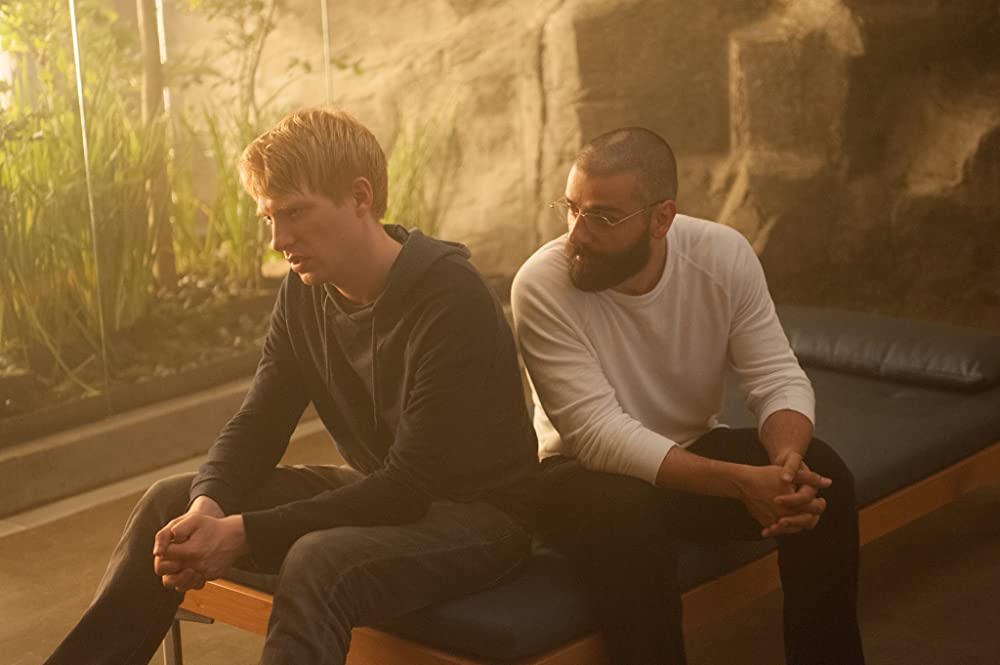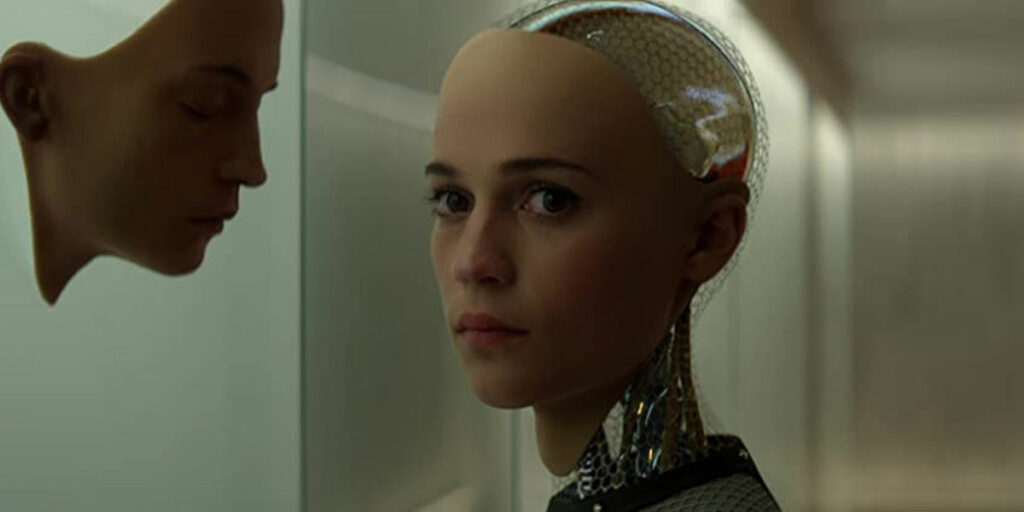By drenching its viewers in the dread of the singularity being crossed, Ex Machina leaves its mark as an outstanding piece of immaculate science fiction.
Ex Machina is a science-fiction film that came out in 2015, the directorial debut of one of my favorite filmmakers working today, Alex Garland. Between this film, 2018’s Annihilation (one of my favorite movies ever), and his Hulu miniseries Devs, he’s already established himself as someone whose work I’ll see no matter what, including his upcoming horror film Men. And it all started with this brilliant gem. Domhnall Gleeson stars as a coder named Caleb, who wins a competition to spend a week at the private home of Nathan Bateman (Oscar Isaac), the CEO of the internet company he works for. Much to Caleb’s surprise, Nathan reveals that he is to take part in an experiment with his latest creation: an artificially intelligent woman named Ava (Alicia Vikander). What starts as a simple series of questions between Caleb and Ava soon evolves into a complex relationship that makes Caleb question why he’s there, what Nathan is doing, and how human Ava really is … and maybe how human he himself really is.
The line between humanity and artificial intelligence and how blurred it can be has been explored many, many times across all types of media and stories, even in the days when it seemed unfathomable to imagine how far technology would advance. I think that any movie that wants to tackle this subject matter in recent years has a bit of a tough task in adding something new to the conversation, or at least getting a new experience out of it. What makes Ex Machina so unique in its approach to that task is how it not only takes place right on that blurred line between human and AI, but also portrays the exact point where it’s finally crossed.
Nathan speaks of that very point, where AI finally passes the singularity and evolves past humankind. This entire movie is the slow, unsettling process of that shift happening, crossing the two entities into each other’s shoes. Caleb initially questions Ava to study her, testing her cognizance and finding out how she functions. But slowly, that dynamic flips, and Ava is asking questions to learn more about him. Though her purposes in doing so are unclear through most of the film, this makes for a magnetic dynamic between these two characters as they meet on that threshold Ava is trying to cross. The pacing is suitably slow and ominous to really let the eeriness of that sink in, making you feel like you’re in some sort of purgatory waiting for an inevitable dark turn to happen, putting every character under a microscope ready to be dissected.
The degree to which Caleb’s head is so disturbingly messed with is clear to see, most infamously in a scene of him going to extreme measures to see if he’s even human himself. It’s hard to blame him when you see how similar organic and artificial creation is, right down to how they process and learn from each other’s patterns and histories and adapt accordingly. I’m not sure what’s creepier: that Ava is advanced enough to adapt like that, or that our own thought patterns are able to be reduced to code and programmed into her in the first place. Nathan even talks about how he used his company’s search engine to gather millions of people’s data and essentially derive how we think and how to replicate that, which may also suggest concern over how much more automated we’re becoming because of things like the internet and overreliance on technology.

Alicia Vikander plays Ava with a scary level of precision. She’s just expressive enough to have you believe she has true intelligence and emotion, but just stiff and unnatural enough to be convincing as someone that was made out of code and machinery. It’s very off-putting whenever she acts on free will and what appears to be genuine desire and anger, but in a way that still feels so believable. Of course, part of that presentation comes from what I consider to be some of the sharpest CGI ever put to screen. I’ve always believed that CGI works best in live-action when it’s not trying to show off, but rather blend in with the practical shots and effects. That’s evident in Ex Machina, as various tactics such as rotoscoping Ava’s human features, shooting scenes with and without Vikander there, and giving Vikander a suit with materials that are easier to alter in post-production, add up to creating a character that always looks like every part of her is really there in those rooms with those people.
Opposite Ava, Gleeson gets a little overshadowed, but he still works really well as the naïve innocent with a decent heart who’s potentially the victim of either Ava, Nathan, or both. The character comes across as a little awkward and a bit of an outsider, but that makes it more believable for him to be susceptible to Ava and develop feelings for her. I also find myself drawn to Nathan, who’s immediately charming enough for you to want to trust him, but secretive and shady enough to not be able to. Yet in other ways he’s unusually blunt and transparent in a lot of his endeavors, wiping away all pretenses in most of his conversations with Caleb and displaying an uncanny understanding of human nature in the process.
As fascinating as all of this is, it wouldn’t hit nearly as hard without the filmmaking crew’s immaculate work in bringing everything together. The use of glass and transparent walls and doors is practically Garland’s signature at this point, but in every project of his it makes sense thematically and is stunning visually. Here, with Ex Machina being about how man and machine mirror each other, it’s only fitting to have the film littered with literal mirrors and reflections of characters. The glass walls also make everyone feel more exposed. There are so few places where these characters can conceal themselves, just as they can’t conceal the very essence of their being that’s forcibly dragged into the open. A few shots are framed to make it look like Caleb is the one in a glass box instead of Ava, and the hellish red lighting that occurs during a power outage speaks for itself in the mood it provides.
My favorite shot in the film comes right at the end. It’s a crowd of people walking and their shadows following along, but it’s shot at an angle that makes it look like the shadows are casting the people and not the other way around. Cold, hypnotic aesthetics like this are to be found in almost every single frame and easily rival those of a Kubrick film. Rob Hardy has done the cinematography for all of Garland’s projects, including Men, and right from the start you can see that the two of them are a match made in heaven. Ben Salisbury and Geoff Barrow have also always collaborated with Garland by scoring his work, and their slightly-distorted, guitar-driven pieces in Ex Machina veer between quietly sinister and overtly nightmarish to equally great effect. When this music is combined with the more disturbing imagery of Ex Machina, there’s a solid argument to be made that this is partially a horror film.
To say that Ex Machina had Alex Garland’s directing career hit the ground running would be a massive understatement. He helmed this film with a level of skill, poignancy, and unapologetic confidence that many people would need at least a decade behind the camera to achieve. Obviously working on big films as a screenwriter helped him get his foot in the door, and he’s lucky enough to have been surrounded by a cast and crew that knew exactly what to bring to his vision. Still, Ex Machina is one of the greatest directorial debuts of the 2010s and a triumphant start to what’s hopefully a long and prosperous career for an up-and-coming all-time great. It had been years since I watched the movie, but rewatching it for this review gave me even more of an appreciation for it. If you like your science fiction seeped in uncomfortable tension and existential dread, Ex Machina is the film for you … and so is Annihilation, so please watch that as well.
Ex Machina is now available to watch on Apple TV, Amazon, and DVD/Blu-Ray.

